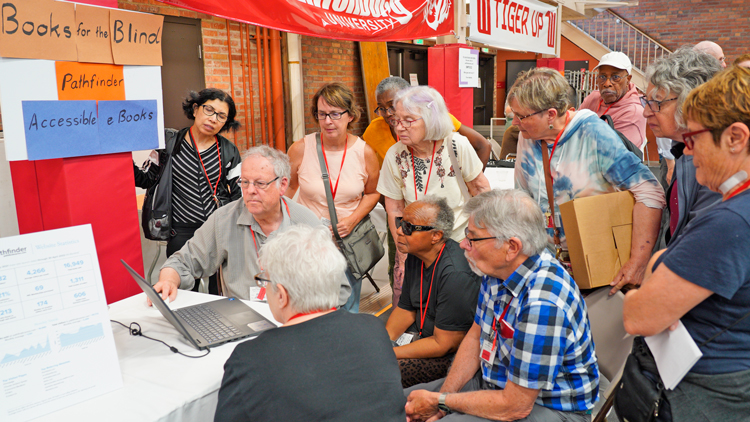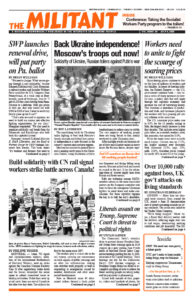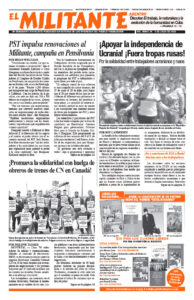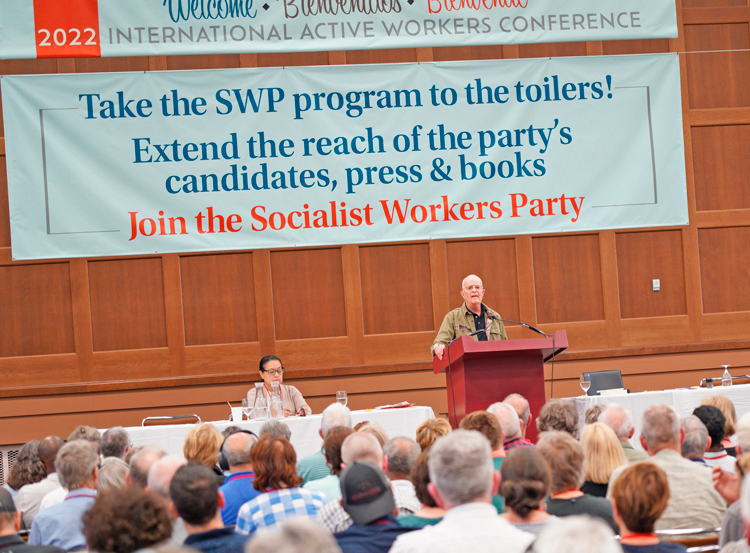Click below for downloadable pdfs of this article in English, French, and Spanish
“We have an unusual opportunity this year to go straight out of this conference into campaigning and other activity focused on the central political and programmatic questions we’re discussing and clarifying here,” said Jack Barnes, national secretary of the Socialist Workers Party. He was speaking to some 350 people at the SWP-sponsored International Active Workers Conference in Springfield, Ohio, June 11.

This year’s annual gathering, the largest since 2009, drew attendance from 10 countries, including members and supporters from the SWP’s sister Communist Leagues in Canada, the United Kingdom, New Zealand and Australia, as well as participants from France, Greece, Iceland, Norway and Sweden. The end of COVID-related lockdowns and travel restrictions made it possible for the first time in three years to hold a truly international gathering, making it stronger politically.
“Take the SWP program to the toilers! Extend the reach of the party’s candidates, press and books. Join the Socialist Workers Party!” — that was the banner at the front of the auditorium. At a rally the closing night, communist workers talked about highlights of the spring’s successful propaganda campaigns and trade union and other activity, as well as projecting continued campaigning this summer.
These next steps include winning hundreds of subscription renewals from the nearly 1,700 new readers of the Militant; getting books by party leaders and other revolutionists into the hands of working people and youth; and using communist election campaigns and candidates to explain the party’s program. There will be a special July effort to win a federal ballot spot in Pennsylvania — for the first time in many years — for SWP candidate for U.S. Congress in Philadelphia, Chris Hoeppner.
Speakers at the closing event also described organizing solidarity with hard-fought strikes by workers and their unions.
The SWP will hold a December convention, Barnes said. Based on discussion by the membership of material prepared by the party leadership, branches will choose delegates to debate and decide the party’s course and next steps, and to elect a National Committee.
Capitalist crisis, workers’ response
Conference proceedings were organized around four plenary reports on today’s accelerating capitalist economic, social, and moral crises; sharpening conflicts among imperialist ruling classes and other powers; and the resulting receptivity among working people to the perspectives of the SWP and communist organizations in other countries.
The conference political report by Jack Barnes pointed to accelerating inflation, a developing sharp downturn in production and trade, and the consequences for the living and job conditions of workers and our families. Working people face the spread of deadly drugs, alcoholism and gambling addiction, as well as rising rates of mental illness, suicide and crime.
Amid these conditions, Barnes said, the working class more than ever has a stake in defending the constitutional rights, protections and political space we need to organize and fight. These rights are under assault by the bosses’ government and political parties, with middle-class “progressives” more and more often on the front lines.
The presentation by SWP National Committee member Mary-Alice Waters — “The Family and Women’s Emancipation: What Two Socialist Revolutions and Our Own Class-Struggle Experience Have Taught Us” — politically armed conference participants to more effectively bring a working-class voice into the raging debate opened earlier this year over the leaked U.S. Supreme Court draft that would overturn the 1973 Roe v. Wade abortion decision.
There was a presentation on “Moscow’s War against Ukraine Opens New Stage in Crisis of Imperialist World Order” by Militant editor John Studer, as well as a report on the party’s work in the unions and labor movement by SWP trade union director Mary Martin.
The presentations were complemented by two question and discussion sessions on the presentations, as well as four classes: “Independent Working-Class Politics vs. Class Collaboration: Lessons from the Struggle for Black Liberation”; “The SWP and Exploited Farmers: An Ally in the Fight for Working-Class Power”; “Lenin, the Bund and Forging the Bolshevik Party”; and “In Defense of Marxism: The Party’s Proletarian Orientation and Our Communist Program.”

More than a dozen displays illustrating conference themes lined one side of the auditorium, attracting interested viewers before and after each session.
Tables after table of books welcomed participants as they entered the hall, with 620 bought overall. Top sellers were more than 50 copies of various issues of New International magazine featuring articles exploring the roots of today’s breakdowns and wars, as well as The Emancipation of Women by V.I. Lenin; the 1957 SWP resolution The Class Struggle Road to Negro Equality; Marxism and the Working Farmer; and the latest Pathfinder Press title, Labor, Nature, and the Evolution of Humanity.
Lively mealtime discussions and evening social activities capped the days.
Crises and war
On top of soaring prices and a coming economic downturn, said Barnes, today’s world is marked by sharp shifts in the imperialist “world order” imposed by the victors of World War II. These conflicts, considerably aggravated by Moscow’s war against the people of Ukraine, have been building for years.
Cutthroat competition for profits tears at the patchwork of stronger versus weaker capitalist states in the so-called European Union, with utter disregard for working people’s life and limb. Currency and trade wars, and their transformation into shooting wars, are on the horizon. The expansionist-minded, Stalinist-molded regime in Beijing poses stepped-up challenges to Washington in Asia, the Pacific and elsewhere.
Capitalism’s economic stresses on our families are pushing down birth rates and increasing pressures on families to care for aging parents.
The biggest target of the propertied rulers and their comfortable middle-class water carriers are working people, those Hillary Clinton during the 2016 presidential campaign scorned as “deplorables.” The capitalist rulers not only deeply despise but increasingly fear them. It is this fear that’s driving the crisis and factionalism shaking the rulers’ twin Democratic and Republican parties and other U.S. political and state institutions.
But for the SWP, Barnes said, it is exactly these “deplorables” — of all backgrounds, regions, and skin colors, both sexes, city and country — “who we are trying to win. That’s who we’re trying to educate, to raise class consciousness. That’s who we’re learning from.”
This fear and disdain for the working class among liberals and the radical left explains much of their panic, real or hyped, over the leaked Supreme Court draft. Insisting that workers and other small producers are the root of all prejudice and reaction — not the capitalist system of exploitation and oppression — the “social justice warriors” peddle the utterly false notion that reversing Roe v. Wade opens a “slippery slope” that threatens every hard-fought gain for the oppressed over the past half century.
Barnes pointed to the fact that polls show public support today for the right of two people of the same sex to marry has grown to over 70% of the population. Support for marriage rights of two individuals regardless of race is even higher.
There’s broad support for “Miranda rights,” which place restraints on how cops can entrap you. There’s no substantial challenge to access to contraception, or motion toward restoring “sodomy laws” victimizing gays.
These rights conquered in past struggles are today recognized and supported by hundreds of millions. They won’t be easily taken away, Barnes said, nor are significant forces organizing to do so.
These major shifts in attitudes extend to growing interest in trade unions, as well, Barnes said. A recent poll shows that more people look favorably on trade unions today than at any time in many decades.
Nothing similar can be said about attitudes toward abortion since Roe v. Wade was handed down in 1973. That ruling undermined the fight for women’s rights. The subsequent half century has left popular opinion on the right to choose an abortion more class-divided and polarized than ever before.
Barnes said that the constitutional rights, the federal system of checks and balances, and other limitations and restrictions on government powers — ratified some 230 years ago by the ruling families to buffer factional divisions among themselves — better serve the needs of workers to organize and fight independently of our exploiters and oppressors than do the high-flown laundry lists of “granted” rights that mark constitutions in France, Canada, South Africa and other “enlightened” regimes.
Better for working people to have protections against the bosses’ state, than “rights” (conditionally) “given” to us by the state.
The U.S. rulers, Barnes said, seek to mask the social ills bred by the profit system by turning these evils into their opposite. He gave the example of today’s New York City subway ads, which claim that using drugs the “right way” can be “empowering.” And Mayor Eric Adams’ celebration of the legalization of marijuana in the state as a big moneymaker and investment attraction for the city fathers.
Barnes pointed out that the late U.S. Senator from New York — Daniel Patrick Moynihan, a Democratic Party politician, member of both the Lyndon Johnson and Richard Nixon administrations, and Social Democratic-leaning supporter of capitalism — coined an accurate term for this phenomenon: “Defining deviancy down.” It describes, Moynihan said, how some officials and public figures, in face of growing social ills, “benefit from redefining the problem as essentially normal.”
SWP branches, Barnes said, will be organizing to study this article, along with others by Moynihan that describe how the family under contemporary conditions is the only place working people can turn for help in face of joblessness, social inequality and other crises imposed on us.
The future for working people in the U.S., Barnes emphasized, remains intertwined with Cuba’s socialist revolution, which marked the renewal of communist leadership in the Americas and beyond. The Cuban toilers’ conquest of state power, under the leadership of Fidel Castro and the Rebel Army, set a powerful example for working people in the U.S. of what we are capable of accomplishing as we build a revolutionary workers party in this country.
Defend Ukraine! Moscow out now!
“No political organization is better prepared to explain the stakes for working people in defeating Moscow’s invasion of Ukraine than the Socialist Workers Party,” Militant editor and SWP National Committee member John Studer said in his conference report. Studer led three reporting teams to Ukraine after the working-class and popular Maidan uprising of 2014 overthrew the Moscow-backed regime. They reported on the conditions facing workers and their fight for national independence.
Since Moscow’s invasion early this year, party members have campaigned with an SWP National Committee statement that explains that the party “is mobilizing its candidates to use the 2022 election campaign to get out the truth and present a foreign policy that starts from the interests of the toilers at home and internationally.” The statement gives unconditional support to the fight for Ukrainian independence and sovereignty and demands an immediate end to Moscow’s military operations and occupation.
It demands a halt to all U.S. economic, banking, and trade sanctions against Russia, whose devastation falls overwhelmingly on working people in Russia, undercutting solidarity between workers and soldiers in the two countries. The statement also demands Washington withdraw all its nuclear weapons and armed forces from Europe.
Citing documents drafted by V.I. Lenin from the opening years of the voluntary Union of Soviet Socialist Republics, Studer explained that the SWP’s support for Ukrainian self-determination is rooted in the party’s political continuity with the Bolshevik-led Russian Revolution and Communist International.
Party members have gotten the Militant — the only working-class source of news on the war and its consequences — into the hands of co-workers on the job, on their doorsteps, at strike picket lines and to working farmers.
Studer described the interest in issues of New International magazine by participants at recent book fairs in Havana, Tehran, Los Angeles and elsewhere in the U.S. These issues explain the root causes of wars in the imperialist epoch, and how the U.S. rulers emerged from World War II atop the imperialist pecking order.
But the so-called American Century abruptly came to an end before it had barely begun, with Washington’s defeats in the Korean and Vietnam wars as milestones, matched by a relative erosion of its commanding economic dominance as well.
With the coming apart of the Soviet Union at the opening of the 1990s, the U.S. had lost the Cold War, not won it, as many of its political, military and academic apologists initially trumpeted. This fact is registered in the trail of stalemated or lost wars waged by Washington in Iraq, Libya, Afghanistan and elsewhere.
This outcome for U.S. imperialism, however, has not been accompanied by the rise of any new capitalist power to replace it, Studer said. The impossibility of a historic surrogate for the world’s final empire was aptly put some 35 years ago in the SWP resolution, “What the 1987 Stock Market Crash Foretold,” published in New International no. 10. “Despite intensifying competition for profits on the world market,” it says, “the rival national ruling classes are chained together in their decline, with the U.S. capitalist rulers at their head.”
Today, exacerbated by Moscow’s invasion, rival capitalist powers are rushing to prepare for future conflicts. The direction of capitalist development — a march toward fascism and world war, horrifically confirmed in the last century — is clearer to see for working people.
“The future of humanity depends on the independent political organization of the world’s toilers,” Studer said. “It is in our hands to take war-making powers out of the hands of the exploiters, to prevent the calamities that imperialism is marching, and stumbling toward.
“But before such calamitous events, the working class here will have our chance. We can forge a mass revolutionary proletarian party able to mobilize and lead millions to make a socialist revolution and conquer state power.”
During a lively question and answer session after Studer’s report, one participant asked whether an SWP candidate elected to Congress would support the U.S. government sending arms to Ukrainians.
“We have no quarrel with how Ukrainians get arms to defend themselves from Moscow’s assaults,” Studer said. “But the longstanding proletarian internationalist position of the communist movement is and remains, “Not one dime, not one soldier for the U.S. rulers and their war machine! No political confidence in the bosses’ government!”
The U.S. rulers do nothing other than advance their own capitalist interests in everything they do. If they extend military aid, it comes with unprincipled strings attached. What’s more, growing layers of the U.S. ruling class, as well as the rulers of France, Germany, Italy and elsewhere, are maneuvering today to pressure the Ukrainian government to give in, settle with Moscow, and make substantial territorial and political concessions. These imperialist voices want to end a war they increasingly see as a threat to their own interests.
“Decisions about starting and stopping wars are class decisions. The only way forward for working people is to fight to unite the toilers in Russia and Ukraine — as well as in the United States and elsewhere — to defeat Moscow’s invasion.”
The family and women’s rights
In 1973 the Militant hailed as a victory the U.S. Supreme Court’s Roe v. Wade decision overturning laws in 46 states that restricted a woman’s access to abortion during the first three months of pregnancy.
“Fifty years of experience in the class struggle have taught us that judgment was inaccurate,” said SWP leader Mary-Alice Waters in opening her conference report. “It soon became clear that the court edict set back the fight to repeal all laws criminalizing or restricting abortion.”
The ruling — decided by the Supreme Court on a political, not constitutional basis — “short-circuited the momentum that was gaining ground in the political fight to win a majority of the working class, male and female, to recognize that a woman’s right to decide whether or not to carry a pregnancy to term is a precondition for women’s equality. And to understand that ending women’s status as the “second sex” is central “to the program the working class must fight for on the road to emancipation.”
Nowhere was that road presented more clearly than by Frederick Engels, one of the founders of modern communism, Waters said. “True equality between men and women,” he wrote in 1885, “can become a reality only when the exploitation of both by capital has been abolished, and private work in the home has been transformed into a public industry.”
Access to abortion under medically safe conditions has sharply declined from its high point soon after the 1973 ruling, Waters said. The meritocratic leadership of groups like the National Organization for Women “became not much more than an electoral appendage of the Democratic Party, with little interest in family questions confronting the working class. At the same time, abortion opponents were allowed to grab ‘the right to life’ as their banner.”

As opposed to sanctifying what has been from the start a bad Supreme Court edict, Waters said, “our starting point is that there can be no road to women’s liberation without dealing with the broader social crises bearing down on the working-class family and addressing the challenges and responsibilities that fall on women as the bearers of new life.”
In the question and answer session later that day, one participant disagreed with Waters’ assertion that an overturn of Roe v. Wade would be positive. She asked Waters what she meant when she said in her report that “the SWP is the party of life, not death.”
“Getting Roe out of the way will create an opportunity for working people to have the discussion we need,” Waters replied. “The job of the courts is not to impose legislation,” as it did in this case, “but to uphold rights and protections that have been wrested from the ruling class in struggles going back to the Bill of Rights.” The 1973 ruling was an obstacle to fighting for access to safe and secure abortions, which is just one part of the broader working-class fight for both women and men today, she said.
It’s essential to “answer those who cloak their assaults on women’s rights — including decriminalization of abortion — under a ‘pro-life’ mantle. The working-class party that fights for the liberation of humanity is a party of life. We must take back that banner as ours.”
During her presentation, Waters noted crucial lessons from the socialist revolutions in Russia in 1917 and Cuba in 1959. The Bolshevik-led revolution “was the first opportunity for a government of the working class to lead a fight for women’s equality.”
She pointed to communist leader V.I. Lenin’s description of the domestic slavery confronting women in Russia a century ago. Those degrading conditions will change, Lenin said, “only where and when an all-out struggle begins (led by the proletariat wielding state power) against this petty housekeeping, or rather when its wholesale transformation into a large-scale socialist economy begins.”
As fellow Bolshevik leader Leon Trotsky explained, that required providing apartments and rural dwellings with running water and electricity. It required schools, jobs, laundries, and child care centers, eradicating illiteracy and combating drunkenness and domestic violence.
Advances in the Soviet Union initiated under Lenin’s leadership and defended by Trotsky were reversed by the Stalin-led counterrevolution, one of the greatest defeats the working class has ever faced, Waters said.
Drawing lessons from the Soviet experience in his 1936 book The Revolution Betrayed, Trotsky wrote, “You cannot ‘abolish’ the family, you have to replace it.” That’s a task that can only be advanced, Waters said, by eliminating capitalism’s economic compulsion on which the family is founded.
Women in Cuba

The second great socialist revolution of the last century took place in Cuba. Fidel Castro and other revolutionary leaders were determined from the outset to deepen women’s involvement in all aspects of social life, clearing away obstacles to their shouldering political responsibilities to advance the revolution. Fidel insisted that a woman’s organization, what became the Federation of Cuban Women, be established to lead these efforts. Those enormous accomplishments are recorded in the book edited by Waters, Women in Cuba: The Making of a Revolution within the Revolution.
The center of the fight for women’s emancipation today is not abortion, Waters concluded. It’s the family. It’s part of a course to advance “the working-class fight for state power — to create the material and social conditions that will enable women and men to realize the basic conditions of our humanity. That means full participation in social labor and the ability to make conscious decisions, benefiting from advances in medical science, related to reproduction as well as production.
“That’s the road not only to the emancipation of the working class,” she said, “but to eradicating the historical roots of women’s oppression.”
SWP’s trade union work
SWP members are active in our unions and carry out work in the broader labor movement, Mary Martin, the party’s trade union director, told the conference. “Workers are showing what we are capable of, as we expand solidarity with each other’s struggles.”
She pointed to several strikes over the last year by members of the Bakery, Confectionery, Tobacco Workers and Grain Millers union at Frito-Lay, Nabisco, Kellogg’s and Jon Donaire. Workers fought to push back “suicide shifts” that wreck family life and endanger workers’ health and safety, winning some gains and important solidarity.

The SWP has built groups of party members, called fractions, in the BCTGM everywhere the party has a branch, alongside fractions in freight rail unions in six cities. It has also expanded the kinds of jobs party members take in BCTGM-organized workplaces, opening up both union and political life to more of the party’s cadres.
Martin reviewed some recent experiences in the unions. Party members have joined co-workers and others in expanding backing for the United Mine Workers union, which has been on strike against Warrior Met Coal in Brookwood, Alabama, for more than a year.
They’ve helped win support among workers and farmers for a two-day strike by rail workers on the Canadian Pacific in March.
And they’ve gotten out the truth, in the pages of the Militant and through union channels, about the deaths of two bakery workers in nonunion jobs in North Carolina.
At the same time, SWP members carry out the party’s propaganda campaigns among co-workers on the job, as they join week in and week out in branch activity to expand the reach of the party’s program among working people at their doorsteps, on picket lines, and at social protests and political meetings.
This trade union and political work described by Martin was followed up the last evening of the conference at a lively rally, with remarks by 13 conference participants from the U.S., Canada, the U.K. and New Zealand.
Maggie Trowe, a member of the Cincinnati branch, described the efforts she and her BCTGM co-workers organized there to back the Alabama miners.
John Hawkins, a party member from Chicago, talked about the work SWP members did recently to win support from working farmers in the U.S. for a solidarity message to Cuban farmers on the 63rd anniversary of Cuba’s sweeping land reform (see article in issue no. 23) and the 61st anniversary of the National Association of Small Farmers (ANAP). The worker-farmer alliance that made possible Cuba’s socialist revolution was built on the bedrock of the land reform.
Osborne Hart, SWP candidate for U.S. Senate from Pennsylvania, described the openings to use the campaign, including concentrated campaigning beginning right after the conference. The party there is petitioning to place the party’s candidate, Chris Hoeppner, on the ballot for U.S. Congress from Philadelphia.
The rally concluded with a fund appeal that raised $44,769 for the party’s work, and a spirited singing of “The Internationale,” the fighting anthem of the working class the world over.

“I enjoyed the class on Independent Working-Class Politics,” Jacob Pirro from Montreal who was attending his first conference, told the Militant. “During the civil rights movement the U.S. Communist Party told its members to help get Democrats into office.”
“In contrast to the CP, Malcolm X and the SWP taught fighters for Black rights, ‘Don’t trust your oppressor.’” That same question faces fighters trying to change the world today, he said.
“I want to learn more about the history of the SWP and its continuity going back to the Bolsheviks,” said Vincent Auger from Seattle, also at his first party conference.
The day after the SWP conference, organized supporters of the communist movement from around the world met with party leaders to plan their coming year’s work. The supporters’ auxiliary organizes the production, printing and distribution of Pathfinder books by SWP and other revolutionary leaders and systematically works to raise funds the SWP uses for its political work.
This year supporters organized a table in the auditorium to show participants the work they’ve done to carry out the party’s proposal in late 2021 to begin formatting books for the blind and visually impaired in several accessible formats, from audio books to braille. It was one of the most visited displays at the conference.


